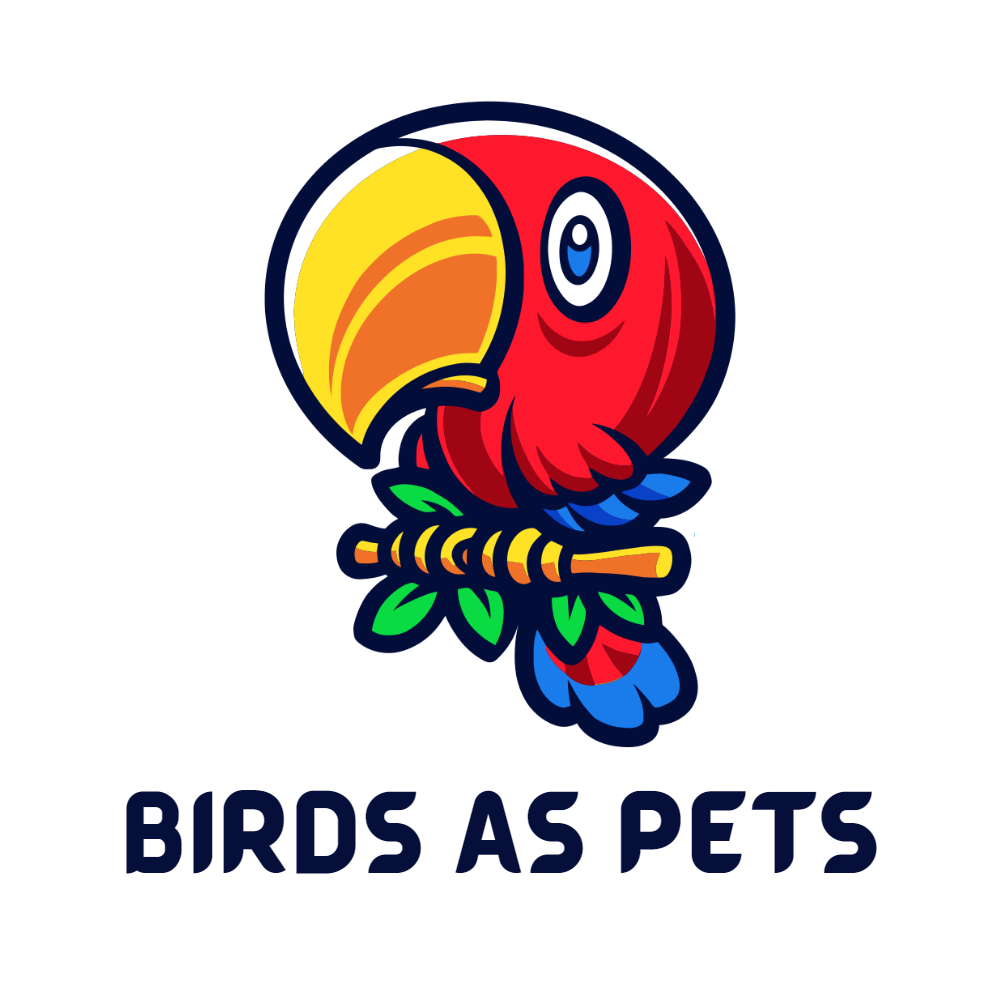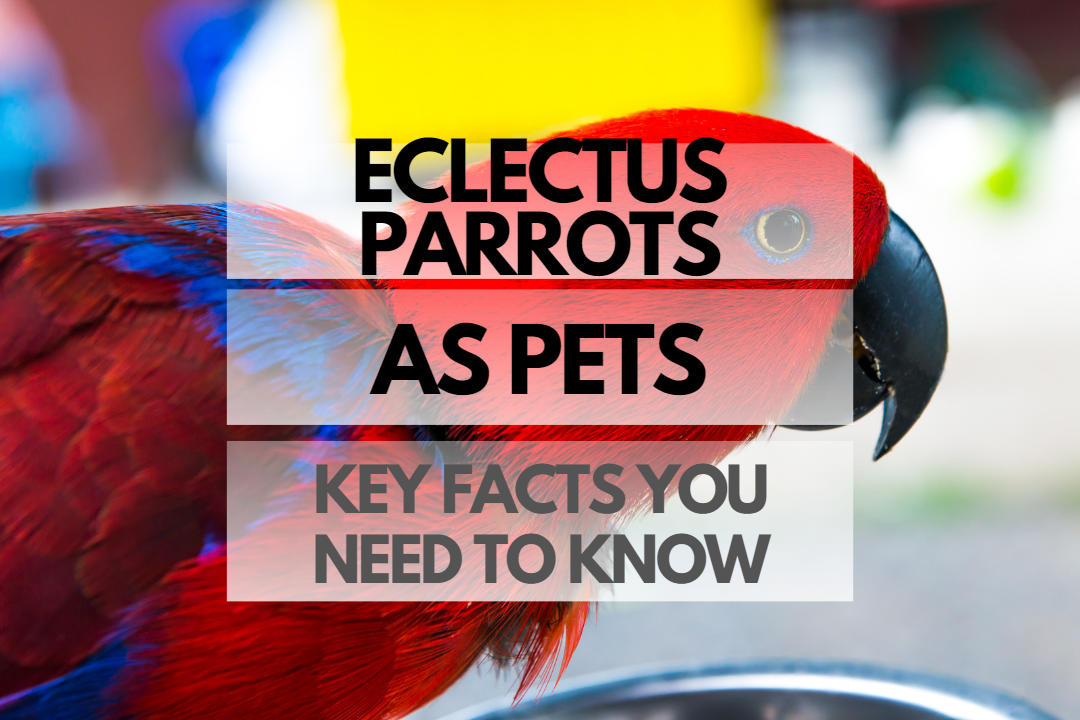Eclectus Parrots are known for their striking colors, intelligence, and unique personalities. If you’re considering adopting one of these beautiful birds as a pet, it’s essential to understand their needs and quirks. In this article, we’ll explore everything you need to know about Eclectus Parrots as pets, from their natural habitat to their care requirements and costs.
Quick Reference Table: Eclectus Parrot Facts
| Fact | Details |
|---|---|
| Scientific Name | Eclectus roratus |
| Size | 12-14 inches (30-36 cm) long |
| Weight | 350-550 grams |
| Lifespan | Up to 40 years |
| Color | Sexually dimorphic; males are bright green, females are red and blue |
| Origin | New Guinea, Solomon Islands, Indonesia, and Australia |
| Noise Level | Moderate |
Where Do Wild Eclectus Parrots Live?
Wild Eclectus Parrots inhabit the rainforests of New Guinea, the Solomon Islands, Indonesia, and Australia. They live in the canopy layer of the forest and are primarily frugivorous, feeding on fruits, seeds, and some flowers.
Eclectus Parrot Lifespan: How Long Do They Live as Pets?
Eclectus Parrots can live up to 40 years or more in captivity when provided with proper care, nutrition, and mental stimulation. Their long lifespan is an essential factor to consider when adopting one as a pet, as they require a long-term commitment. Time investment is also crucial, as these intelligent birds need regular socialization, mental enrichment, and care to thrive.
Are Eclectus Parrots Good Pets?
Eclectus Parrots can make excellent pets for the right person. They are intelligent, affectionate, and have a unique, engaging personality. They’re also relatively quiet compared to other parrot species, making them a suitable choice for those who prefer a less noisy bird. However, they do require a significant time commitment and have specific dietary needs that must be met for their well-being.
Are Eclectus Parrots as Pets Good for Beginners?
Eclectus Parrots may not be the best choice for first-time bird owners due to their unique dietary requirements and sensitivity to stress. However, with proper research, preparation, and commitment, a beginner could successfully care for an Eclectus Parrot.
Are Eclectus Parrots Easy to Care For?
Eclectus Parrots have specific care requirements that can be more challenging than those of some other parrot species. Their diet, in particular, requires careful attention and balance. Additionally, they are sensitive to stress and need a calm, stable environment to thrive. With proper knowledge and dedication, however, caring for an Eclectus Parrot can be a rewarding experience.
Eclectus Parrot Pros and Cons
| Pros | Cons |
|---|---|
| Intelligent and affectionate | Require a specific diet |
| Moderate noise level compared to other parrots | Sensitive to stress |
| Striking appearance | Long lifespan requires a long-term commitment |
| Can be housed with other Eclectus Parrots | Not ideal for first-time bird owners |
Eclectus Parrot Price and Costs
The price of an Eclectus Parrot can range from $1,000 to $3,000, depending on factorssuch as age, sex, and breeder reputation. Initial setup costs for a suitable cage, perches, toys, and other accessories can range from $500 to $1,000. Ongoing expenses include a balanced diet, veterinary care, and replacement of toys and accessories, which can cost between $50 and $100 per month.
Where to Buy Eclectus Parrots
When looking to purchase an Eclectus Parrot, it’s essential to find a reputable breeder or rescue organization. Reputable breeders will prioritize the health and well-being of their birds and can provide valuable information on their history and care. Rescuing an Eclectus Parrot from a rescue organization can be a rewarding experience, as you provide a loving home to a bird in need.
Caring for Eclectus Parrots
Eclectus Parrot Food
Eclectus Parrots require a balanced diet to thrive. They should be offered a variety of fresh fruits, vegetables, and leafy greens, as well as a high-quality pellet diet. It’s essential to avoid high-fat foods, such as seeds and nuts, as they can lead to health issues in Eclectus Parrots. It’s also crucial to provide fresh water daily and avoid feeding them chocolate, avocado, or foods high in salt or sugar.
Health and Common Issues
Eclectus Parrots are prone to certain health issues, including feather plucking, vitamin A deficiency, and respiratory infections. Providing proper nutrition, a clean environment, and regular veterinary care can help prevent these issues. It’s essential to monitor your Eclectus Parrot for signs of illness and seek veterinary care promptly if any concerns arise.
Signs of Healthy Eclectus Parrots
| Healthy Eclectus Parrot | Sick Eclectus Parrot |
|---|---|
| Bright, clear eyes | Cloudy or watery eyes |
| Clean, smooth feathers | Disheveled or plucked feathers |
| Active and alert | Lethargy or decreased activity |
| Normal droppings | Abnormal droppings (color, consistency, or frequency) |
| Strong grip on perches | Weak grip or difficulty perching |
| No signs of respiratory distress | Labored breathing, wheezing, or sneezing |
Eclectus Parrots Pet Insurance
Eclectus parrots are beautiful and unique birds that can make great pets. As with any pet, it’s essential to consider pet insurance to ensure your feathered friend is covered in case of illness or injury. Many pet insurance companies offer plans specifically for exotic birds like the Eclectus parrot, providing coverage for veterinary bills, accidents, and even theft. It’s a good idea to research and compare various insurance providers to find the perfect plan for your parrot’s needs.
Personality and Behavior
Eclectus parrots are known for their vibrant colors and captivating personalities. They are intelligent, curious, and affectionate birds that thrive on social interaction and mental stimulation. Eclectus parrots can be quite gentle and even-tempered, making them a pleasure to have around the home. They are also known for their playful nature, enjoying various toys and games to stay entertained.
Are Eclectus Parrots Social?
Yes, Eclectus parrots are highly social creatures that crave companionship and attention from their human caretakers. They form strong bonds with their owners and enjoy regular interaction, such as playing, talking, and cuddling. Providing your Eclectus parrot with plenty of socialization and mental stimulation will help keep them happy and healthy, reducing the likelihood of behavioral issues such as feather plucking or excessive screaming.
Speech and Noise of Eclectus Parrots
Eclectus parrots are renowned for their remarkable ability to mimic human speech and various sounds. They have a clear, human-like voice and can learn an impressive vocabulary with proper training and interaction. While they are not as loud as some other parrot species, Eclectus parrots can still be quite vocal and may emit natural calls and sounds that can be quite noisy at times. However, their speech and vocalizations are generally considered to be charming and entertaining by their owners.
Similar Species to Eclectus Parrots
There are several species of parrots that share similar traits with the Eclectus parrot, such as:
- African Grey Parrots
- Amazon Parrots
- Macaws
- Cockatoos
Though these parrots share some similarities with Eclectus parrots, each species has its own unique characteristics and care requirements, so it’s essential to research and understand the specific needs of the parrot species you are interested in.
Can Eclectus Parrots Live With Other Pets and Birds?
Eclectus parrots can coexist with other pets and birds, provided they are introduced properly and given enough space to feel comfortable. However, it’s essential to monitor their interactions closely and ensure that all pets are getting along peacefully. Keep in mind that each bird has its own personality, and some may be more tolerant of other pets than others.
Are Eclectus Parrots Legal to Have as Pets?
In most cases, Eclectus parrots are legal to own as pets. However, it’s crucial to check your local laws and regulations to ensure that you are allowed to keep an exotic bird like the Eclectus parrot in your area. Additionally, make sure to purchase your bird from a reputable breeder or rescue organization to ensure that you are not supporting the illegal wildlife trade.
Additional Resources
Here are some helpful resources for further information on Eclectus parrots:
- Books: “Eclectus Parrots” by Rosemary Low
- Forums: Avian Avenue and ParrotForums
- Facebook Groups: Eclectus Parrot Owners and Eclectus Lovers
- Scientific Articles: Search for research articles on Eclectus parrots through Google Scholar
FAQ for Eclectus Parrots as Pets
Do Eclectus parrots talk?
Yes, Eclectus parrots are known for their ability to mimic human speech and can learn an impressive vocabulary with proper training and interaction.
Are Eclectus parrots suitable for families with young kids?
Eclectus parrots can be suitable for families with young kids, but it’s essential to teach children how to interact with the bird gently and respectfully. Adult supervision is recommended during interactions between young children and the parrot.
Can Eclectus parrots be trained?
Yes, Eclectusparrots are intelligent birds that can be trained to perform a variety of tricks and tasks, as well as learn to talk. Positive reinforcement and patience are key to successful training.
How do I know what gender Eclectus parrots are?
Eclectus parrots are sexually dimorphic, which means that males and females have distinct physical differences. Males typically have bright green plumage, while females have red and blue or purple plumage. This makes it relatively easy to determine the gender of an Eclectus parrot.
What is the lifespan of an Eclectus parrot?
With proper care, Eclectus parrots can live up to 30 years or more. Providing a balanced diet, appropriate veterinary care, and mental stimulation can help ensure a long, healthy life for your parrot.
What kind of diet do Eclectus parrots need?
Eclectus parrots require a varied and balanced diet that includes fresh fruits, vegetables, nuts, seeds, and high-quality pellets. A diet rich in vitamin A is particularly important for these birds, as they are prone to vitamin A deficiency. Always consult with an avian veterinarian to determine the best diet for your specific bird.

